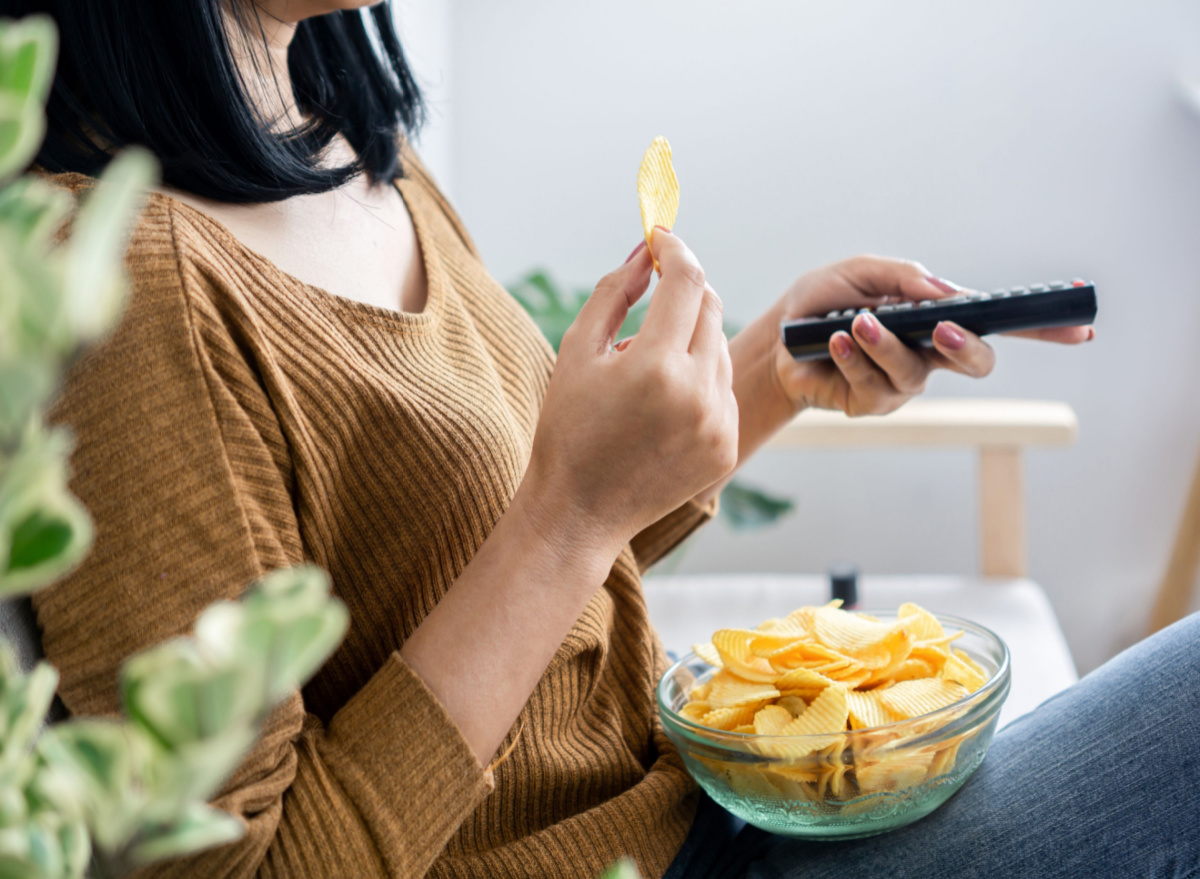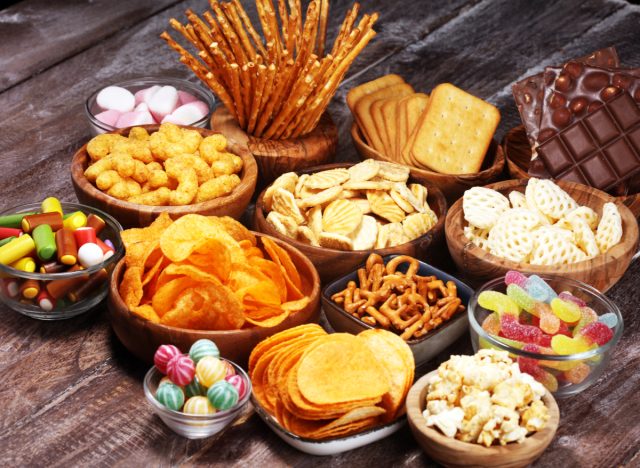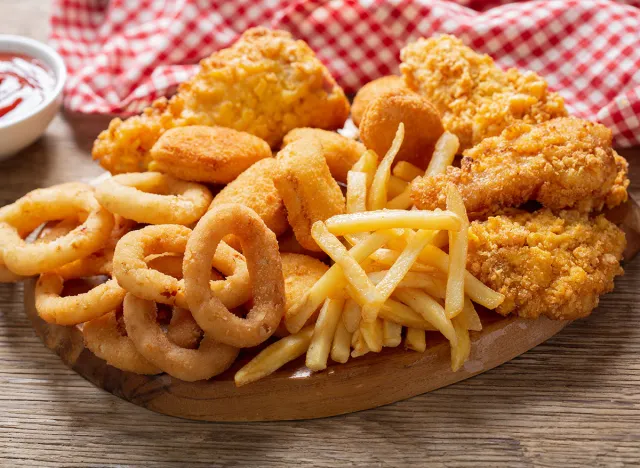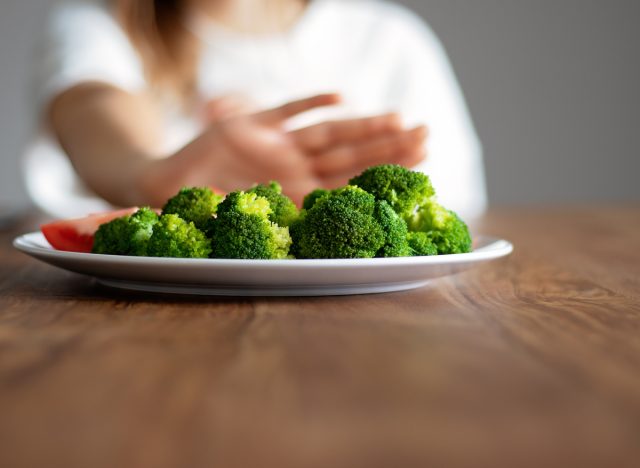
The liver is an essential organ that regulates chemicals in the blood, produces bile, metabolizes food, stores glycogen, vitamins, and minerals, and processes and excretes drugs. These are just some of the major functions of the liver, and without a healthy liver, any number of these tasks could be compromised. Compared to other organs, the liver has a great capacity to regenerate itself after damage. While that is a fortunate fact, you don't want to rely on the liver's unique regenerative capabilities rather than making sure to take care of it from the get-go.
Your eating and drinking habits can drastically impact your liver function—both positively and negatively—so it is important to make choices in the best interest of your liver and body as a whole. To help keep your body in prime condition, here are the four worst eating habits for your liver.
Eating too much sugar

It is likely no surprise to you that processed sugar added to food and drinks can lead to negative health outcomes. Added sugar can raise blood pressure, increase chronic inflammation, and lead to weight gain, diabetes, and fatty liver disease, all of which are linked to increased risk for heart attack and stroke, according to Harvard Health. You may be surprised to learn the added sugar you consume can actually increase the production of fat in your liver, which can lead to fatty liver disease and type 2 diabetes.
Not all sugars are created equally, and it is important to differentiate the sugar naturally found in fruits and vegetables, which is not indicated to impair liver health from added sugar used in many processed food and drinks. In fact, one study found participants who drank fructose-sweetened beverages had fat production twice as high as those who drank glucose-sweetened beverages. Another finding in the study concluded that sucrose, the form of sugar most commonly consumed by humans, raised fat synthesis slightly more than the same amount of fructose.
Eating too many processed foods

This is a broad category of food and drink and includes many packaged, shelf-stable, frozen, and refrigerated items. Many of these beverages and food items contain added sugar, which we know can negatively impact your liver health. Processed meats like hot dogs, pepperoni, cured meats, and other common foods like bread, pastries, cereal, and desserts contain ingredients that can do harm, too.
One recent study found higher intake of ultra-processed foods is associated with non-alcoholic fatty liver disease (NAFLD), and additional research notes high sodium intake, a nutrient commonly found in processed foods, is also associated with an increased risk of NAFLD and advanced liver fibrosis.
Eat This! Tip: While a healthful diet can include a small number of processed foods, it is best to look for those without added sugar, nitrates, and nitrites, and choose varieties with lower sodium content and less processing. For example, whole grain bread has more essential nutrients, like fiber, intact compared to white bread. Focus the majority of your food intake on whole foods and use herbs, vinegar, sauces, and low-sodium and low-added sugar seasoning for added flavor.
Eating fried foods too often

French fries, chips, and pastries, oh my! While many of your favorite foods may fall into this category, the fat content of these foods may be forcing your liver to work overtime. Fried foods are often prepared with low-quality fat sources like corn oil, which goes through extensive processing and contains high amounts of omega-6 fat, which is thought to increase inflammation in the body when consumed in too high amounts and imbalanced with omega-3 intake.
Fried foods are often high in sodium as well, another risk factor for liver dysfunction, and are often enjoyed with sauces, toppings, and dips that contain added sugar.
Eat This! Tip: It is best to limit your intake of fried food, and if you do plan to fry at home, consider using better quality oil. Peanut and avocado oil are best for frying as they have a higher smoke point than other common oils like olive and contain better quality fats compared to other frying oils. When cooking at lower temperatures, olive oil is a great option packed with healthy fats.
Skipping fruits and veggies

Produce contains so many valuable nutrients that are often not found as concentrated in other food sources, such as antioxidants and fiber. Plus, certain fruits and veggies may actually contain compounds that protect the liver and may even enhance its detoxification function. For example, cruciferous veggies like Brussels sprouts were found to increase the functioning of detoxifying enzymes in the liver. Additionally, antioxidants found in berries, grapes, grapefruit, and cactus pear fruit demonstrate liver-protective abilities.
Eat This! Tip: According to the Centers for Disease Control and Prevention (CDC), adults should eat at least 1.5 to 2 cups of fruit per day and 2 to 3 cups of vegetables per day. While specific recommendations may vary slightly depending on age and sex, this is a great goal for most adults. A breakfast smoothie packed with berries and kale, shaved Brussels sprouts in a lunch salad, a snack of grapefruit, and steamed broccoli at dinner is an example of a simple eating plan that provides nutrients that will positively impact your liver.